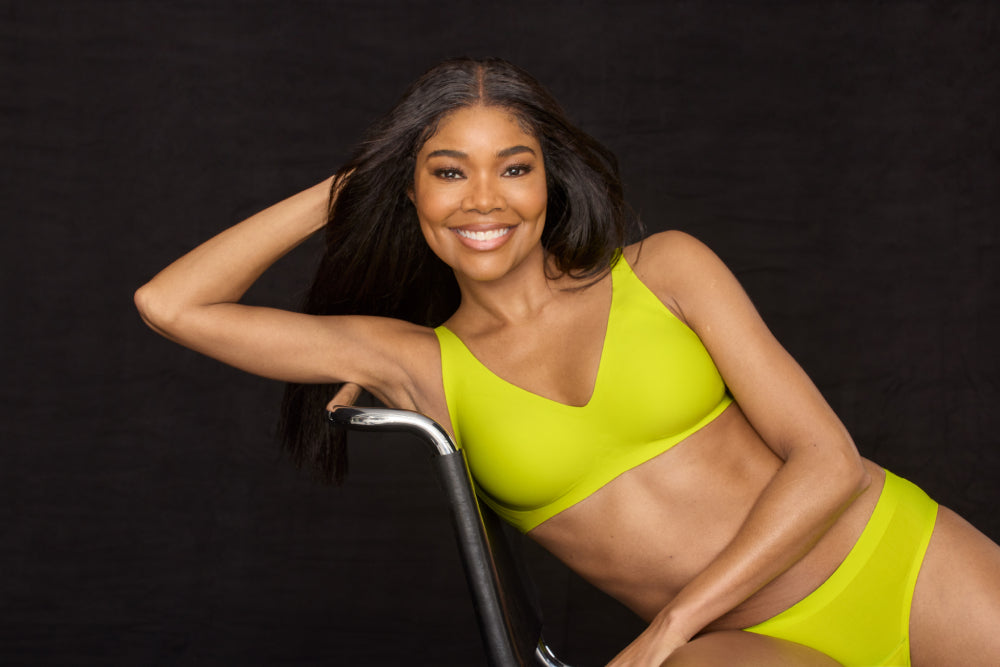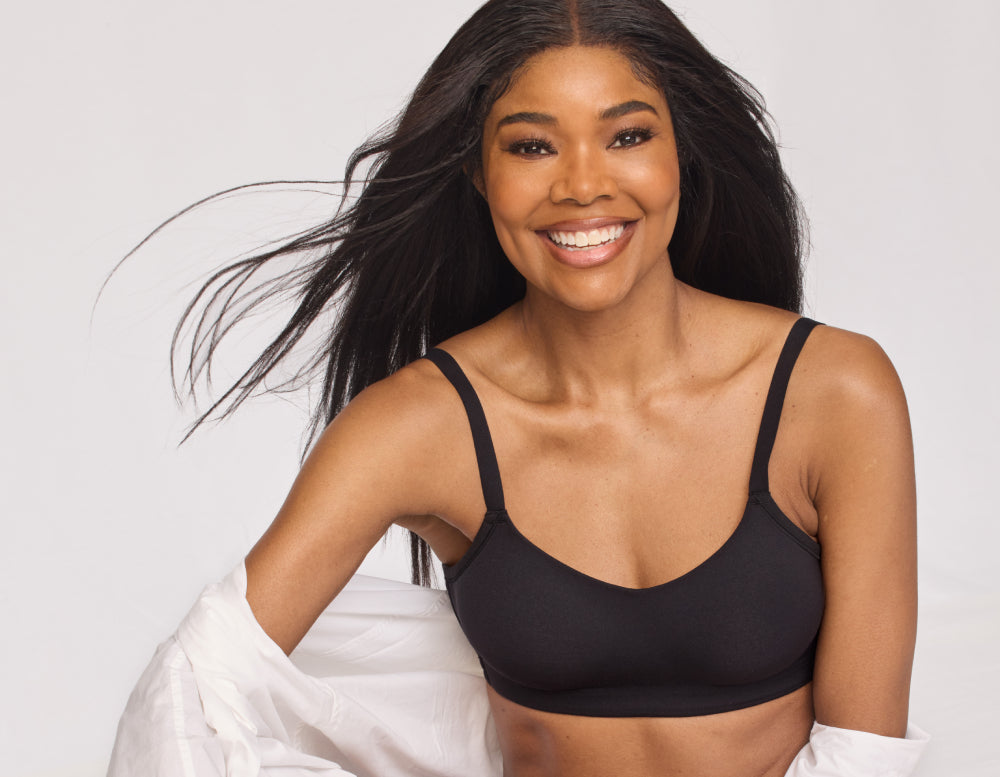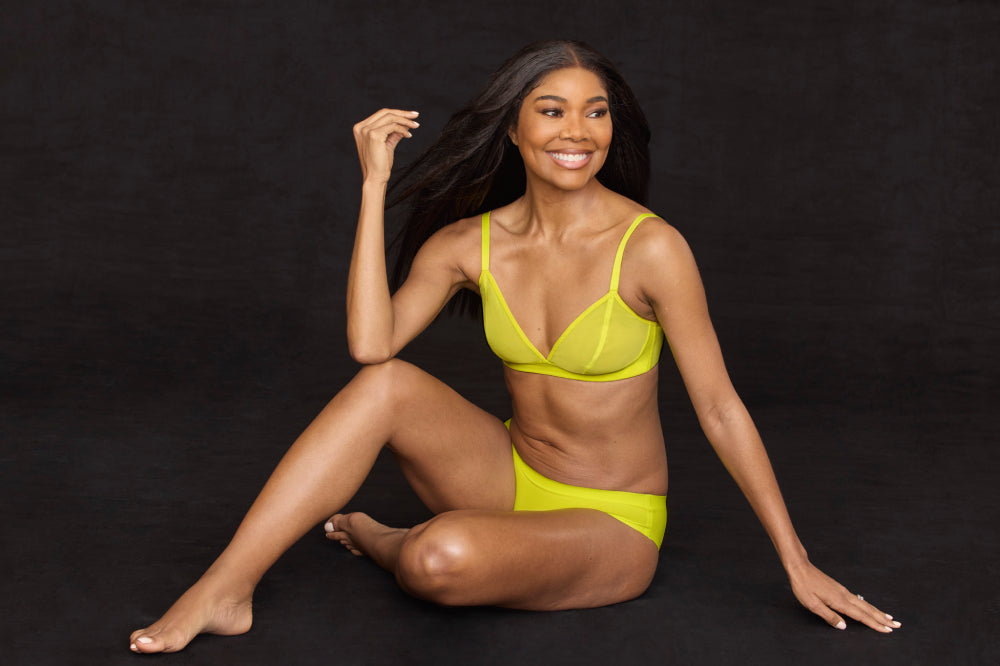How Gabrielle Union Embraces Her Body, from Period Mishaps to Thong Triumphs

Gabrielle Union is a lot of things.
She’s an entrepreneur, a mom, a fierce advocate of women’s health and sexual violence prevention, a film producer, and, of course, a Y2K style icon.
As of late, she’s also been crowned Knix Global Brand Ambassador—and star of the Knix for Life campaign, which aims to tell the true story of every body. That is, the story of bodies that are ever-evolving, in a constant process of change that should be celebrated at every juncture.
“Everything I’ve done, everything I’ve been outspoken about, this body has done it all with me. Every body has a story,” voices Gabrielle Union in the unrestrained campaign video.
When I hop on a Zoom call with her on a cloudy afternoon in early March, she’s as uninhibited (and, may we say, unapologetic) as she seems onscreen. There’s no topic of discussion too taboo, no issue too big to speak to with a sense of unvarnished sincerity.
From first-period blunders to flipping the middle finger to ageist expectations, read ahead for insights into our candid conversation with the multi-hyphenate actress.
She Gets Real About Periods
Stars, they’re just like us: they, too, have been failed by lack of education surrounding female anatomy.
When I ask Gabrielle about a time when she had to learn to embrace bodily changes, she immediately flashes back to the early days of puberty and periods. “I remember the horror of when my period would come, that I was going to be exposed as having a period because of these accidents at school,” she tells me.
She recalls, in particular, the pang of getting her period while swimming with friends as a young teen. Just like that, she felt landlocked—until a friend encouraged her to use a tampon for the first time.
After struggling with its application, her friend broke it to her: she’d been targeting the wrong hole with the tampon, and with pads prior to that. The mystery of her dreaded accidents had been solved, just like that, with access to the right information about her own body.
Aside from this being a story of genuine friendship (we could all use a friend like that), it’s also a story of knowledge as empowerment. Ever since, Gabrielle says she’s prided herself on being the friend that’s like, “Girl, let me tell you what’s really going on.”
“I was finally empowered with information so I knew how to put a pad or tampon in,” she says. “That gave me the confidence at that stage of life because I didn’t know—no one gave me the particulars that would help me stop having accidents.”
It’s a sense of confidence she’s carried with her since, including her diagnosis with adenomyosis, a painful condition—similar to endometriosis—caused by tissue growth on the muscular wall of the uterus. “I can take control of this, first and foremost with information” she remembers thinking to herself. “I’m not crazy and I’m not imagining these things.”
When You Gain Knowledge, You Lose Shame
If there’s a theme that emerges throughout our chat, it’s that knowledge is empowering.
For Gabrielle, breaking free from misinformation and learning more about our bodies isn’t just a means of self-empowerment, but an important form of collective empowerment.
“Knowledge is power, and you can take control of your life with information in community and the sharing of resources and solutions,” she says—the strong will she’s known for piercing through. Even further, she relays that withholding information—especially knowledge of our bodies—is a form of oppression.
When we tap into knowledge, we also often tap into community. Experiences we once thought made us defective, we realize, are being experienced by so many others. In seeking out information and self-discovery, don’t be surprised to find a well of support waiting on the other side.
“We’re waiting. We’ve got a welcome basket,” says Gabrielle.
Just as her teenage friend exemplified earlier, when you tap into knowledge, you become a resource to your community. Something that seems as simple as sharing information on how to insert a tampon can have striking ripple effects.
“I think it’s hard to be impactful under the shroud of shame, secrecy, embarrassment,” she shares. “The more we learn about ourselves and the more we realize there’s other people experiencing similar things, the [more we] can plug into community.”
When it comes to understanding your body, its functions and many phases of life, no one should be relegated to the shadows. Knowledge takes out the guesswork—and community offers a much-needed dose of support. “We’re here,” says Gabrielle. “You don’t have to be alone and you don’t have to guess.”
Thongs Are Always Age-Appropriate
In case it wasn’t already clear, Gabrielle won’t be adopting the coastal grandma aesthetic anytime soon—but don’t be shocked to find her oceanside flaunting a thong bikini.
As someone who’s long been in the public eye, I ask how she navigates social pressures and expectations surrounding body image. “By blowing up people’s ideas of what’s appropriate for a 51-year-old,” she says, bluntly. “I’m going to wear the thong. Yeah, you’re going to see it.”
For her, joy and freedom are fruits born from self-assurance—why would she care about the opinion of someone who’s never known the joy and freedom of being true to yourself?
“When I stopped caring about what everyone thought and everyone else’s opinion, the good times started rolling in,” she tells me. “I’m not going to be shut away into a closet to sit in a rocking chair in a sweater set. I’m going to be me, every day.”
Conforming to the construct of what’s deemed “age appropriate,” in her view, is a disservice to ourselves if it means compromising the bliss of living authentically. What that looks like is up for us to define.
In Gabrielle’s words, it comes from “owning ourselves, our stories, and our bodies.” And when it comes to Knix, “you feel important at every stage and at every age.”
—
Shop Gabrielle’s looks, designed for the reality of our bodies and the demands of real life.











